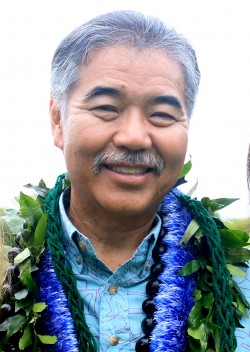Ige Visits Molokai on Campaign for Governor
State Senator and Democratic candidate for governor David Ige arrived on Molokai last week to talk story with residents before primary elections in November, challenging incumbent Gov. Neil Abercrombie.
Serving 28 years as a senator and a career in electrical engineering, Ige focuses on issues regarding education, economic development and the environment. Ige sat down with The Molokai Dispatch Friday to discuss issues relating to the Molokai community.
Question (Q): For you, what makes Molokai unique from the other islands?
David Ige (DI): This is my first time on Molokai in about 30 years. It is good to see that a lot of things have remained the same and a lot in Kaunakakai looks familiar since my last visit here. I’m very much aware that Molokai wants to be part of defining their future and I think that’s a good thing. There’s definitely a sense of community on the island and residents want to be involved with what happens in the future.
Q: What are the island’s biggest challenges in your opinion and what would you do to assist residents in overcoming them if elected?
DI: As I get around and talk with people, I think the public schools are a big challenge. As a small school sometimes they’re penalized because of the way the funds and resources are allocated. As a rural community, I do see and understand that they have concerns about the quality of education and the opportunities that are available for the students. Students in this community should have the experiences and opportunities that any other student in the public school system would have.
Q: What are your reasons for running for governor?
DI: My reason for running is because there is a statewide desire for change and people are not satisfied. They have the sense that the government is not listening, and more importantly the government is not working for them. It really is about restoring faith and confidence in government, government transparency, and it’s about government doing its job.
A lot of that has to do with regulation of pesticides and ensuring that our communities are safe and healthy; it’s about running public schools in a way that presents opportunities for young people; and it’s about growing the economy but ensuring that it’s aligned with each and every island. Community-based economic development is about finding opportunities the community can embrace and create jobs for young people.
Q: What do you see as the direction of Molokai’s energy future?
DI: My last visit here was actually right after I graduated college as an electrical engineer and I had actually done work for Molokai electric back then, looking for opportunities for alternative energy and ways to reduce the cost. I’ve come to the conclusion that we need to look at each island and look at the potential each has to be self-supporting and self-sustainable.
I really believe that we shouldn’t be trying to export energy from Molokai. I haven’t really looked at the specific proposals or had any discussions with anybody, but it really is about the people of Molokai working to find those solutions that work for them. The electricity needs on the island are relatively limited so I think there are a lot of opportunities and the key is energy storage. There are various options for renewable energy and all of those sources are intermittent. So the challenge is finding ways to store the energy generated that would allow Molokai to go off-grid and become self-sustainable.
Q: The discussion of GMOs and biotech is currently an important issue for many residents. What’s your opinion on this topic?
DI: We need to do a better job at managing our agricultural land and really developing long-term plans. I think it’s about finding ways for agriculture to coexist. There are different needs for different farmers and what they’re growing and I think we need to be smart about looking and facilitating how the lands are used, trying to get farmers to be compatible and make it work for everybody.
A big part of that is water. The state has been investing in the Molokai irrigation system. I know that we have been providing funds across the state to support water development and irrigation systems. As plantations went out of business, a lot of irrigations systems changed ownership and there hasn’t been people keeping them up. So I think that’s a state function—water development, access to water, and it’s really important to expand agriculture on Molokai.
The other part of ag is trying to help the small farmers. There’s a transition across the state from big farms, to smaller independent farms that requires the state to have a different role. That means understanding what small farmers need to be economically viable and trying to facilitate and help organize co-ops in more working arrangements.
Q: What do you want Molokai residents to know about you?
DI: I’ve learned three things in public service: It’s really about being open, being honest and communicating. Part of that is your position on issues, transparency, and just getting information out. I think it’s important to listen and be respectful; giving each side in all issues an opportunity to say what’s important to them. Most importantly, it means taking all of those inputs and making the best decision possible in the best way possible to move the state forward. Finding common goals and finding win-win solutions will allow us to bring the community together and move the state forward.












Don't have a Molokai Dispatch ID?
Sign up is easy. Sign up now
You must login to post a comment.
Lost Password